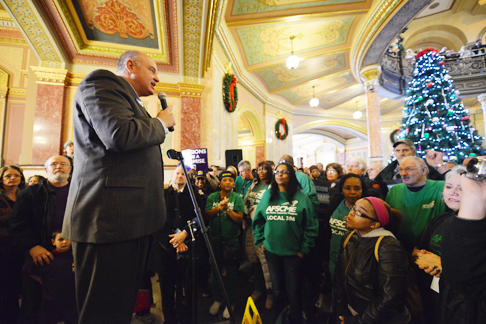
Pat Barcas photo
Illinois AFL-CIO President Michael Carrigan speaks in the rotunda in Springfield Jan. 3. He said his organization will not bow to anti-union, unconstitutional legislation in Illinois, and unions deserve the right to their pensions that they paid into throughout the years.
By Pat Barcas
Staff Writer
Thursday, Jan. 10, 2013
SPRINGFIELD — The long and complicated road to pension reform in Illinois hit a stop sign this week as Governor Pat Quinn’s plan failed to even be voted on Jan. 8 in Illinois’ House of Representatives. As of press time, no further action had been taken, with a deadline of noon Wednesday, Jan. 9.
Quinn tried to rally a vote early in the day and expounded on the need for a vote in a press conference Tuesday.
“Pension reform has confounded Illinois legislatures and governors for 70 years. There have been 12 governors, 13 speakers of the house and 12 presidents of the senate that have grappled with this issue, and we have continued to grapple with this issue. We’re working night and day on this issue,” said Quinn.
He said that each day of inaction regarding the $96 billion state pension obligation costs the state $17 million.
“That’s over $100 million a week that we are seeing our pension liability go up. If the General Assembly doesn’t act, our economy suffers,” he said.
Quinn’s support came in the form of a bill, SB1673 Amendment 10, which was passed by the House Personnel and Pensions Committee, but failed to be voted on Jan. 8.
According to the Illinois Federation of Teachers, the bill creates an unelected, eight-member “Pension Review Commission” charged with drafting pension-cutting recommendations. The commission would be required to report their findings to the General Assembly by April 30, 2013. The group’s recommendations would become law unless rejected by the House and Senate.
The CTU has outlined what they call a “slew of problems with the bill,” including unconstitutionality in the form of a unilateral decrease in active member and retiree benefits, an increase in retirement age, cost shifts for schools, and increases in member contributions.
AFSCME says the proposal would also change the way the annual cost-of-living adjustment (COLA) is calculated, drastically reducing its value over time. A bipartisan group of state legislators has also unveiled a pension reform plan that the We Are One Illinois coalition found has “significant problems” but represents a real attempt to move the conversation forward. The details of that plan are still being analyzed.
Teachers, laborers, and other public workers totaling 3,000 convened at the capital Jan. 3 and 4 to protest potential anti-union legislation, including pension-cutting House Bill 1447, and pension-cutting Senate Bill 1673.
The next General Assembly was scheduled to be sworn in Jan 9. They will convene later this week, with more talks to continue.
Pat Barcas’ e-mail address is pat@foxvalleylabornews.com.
